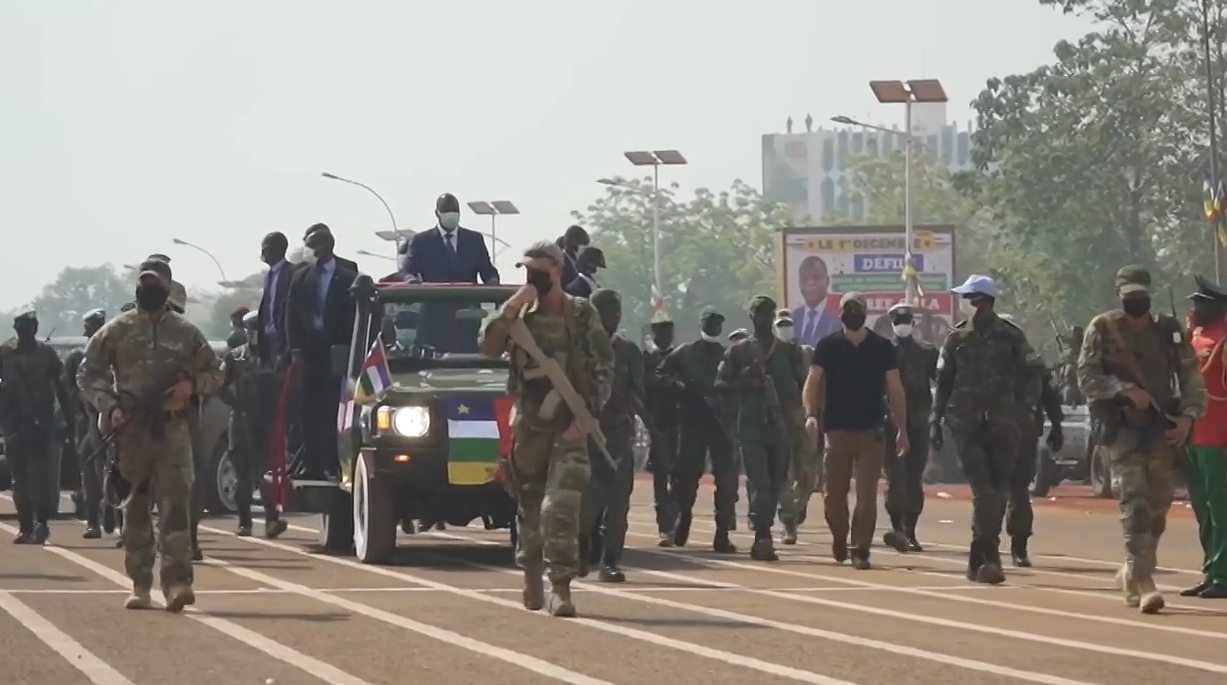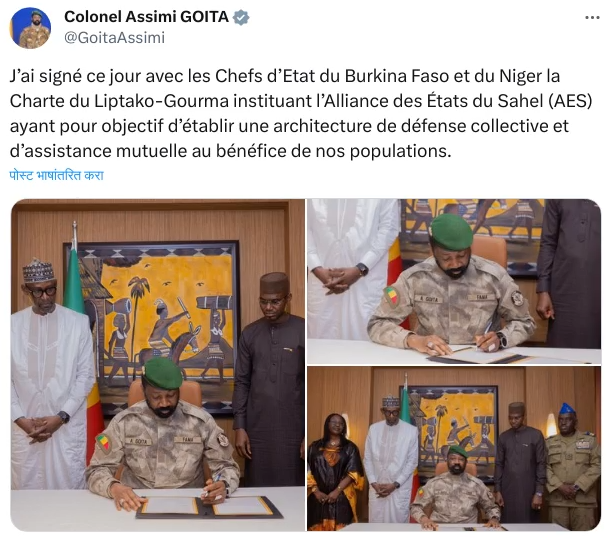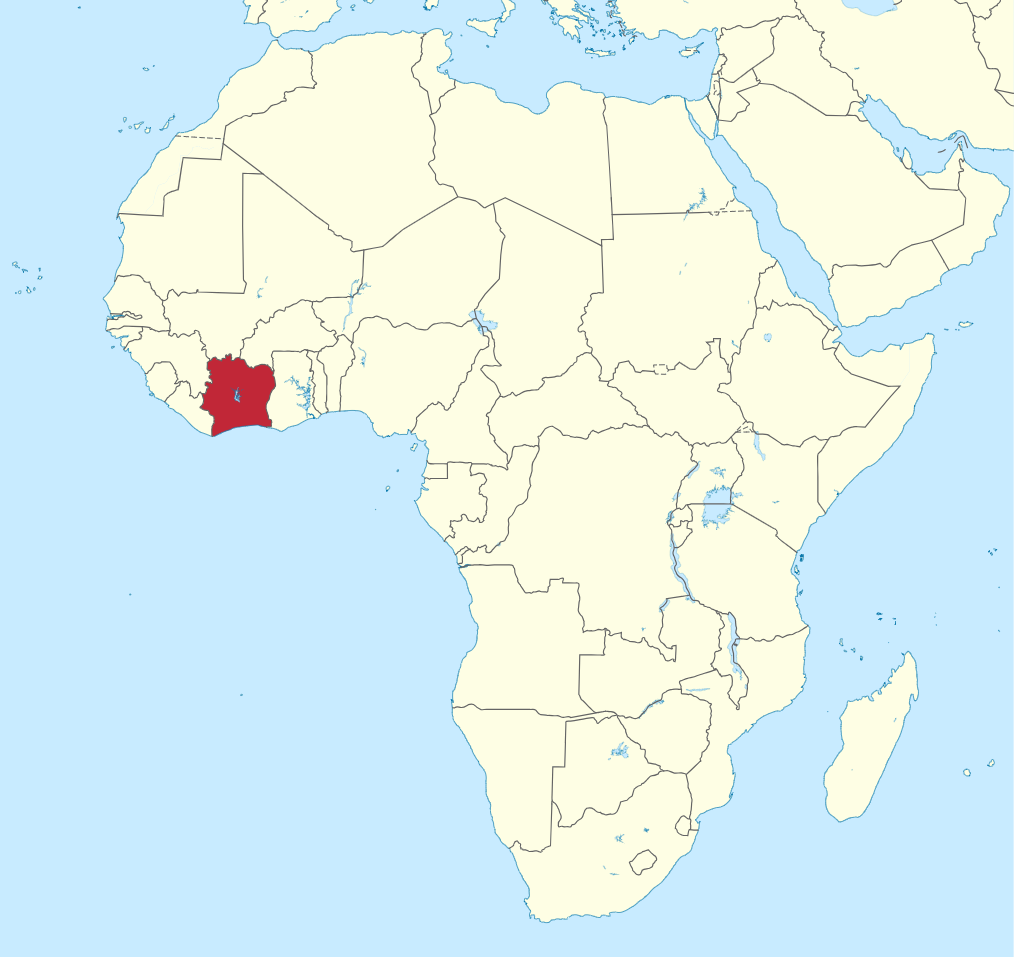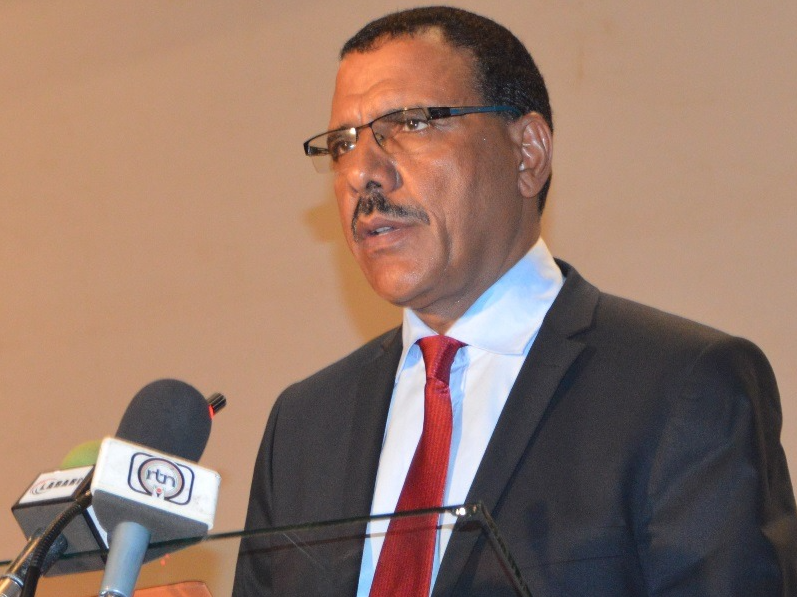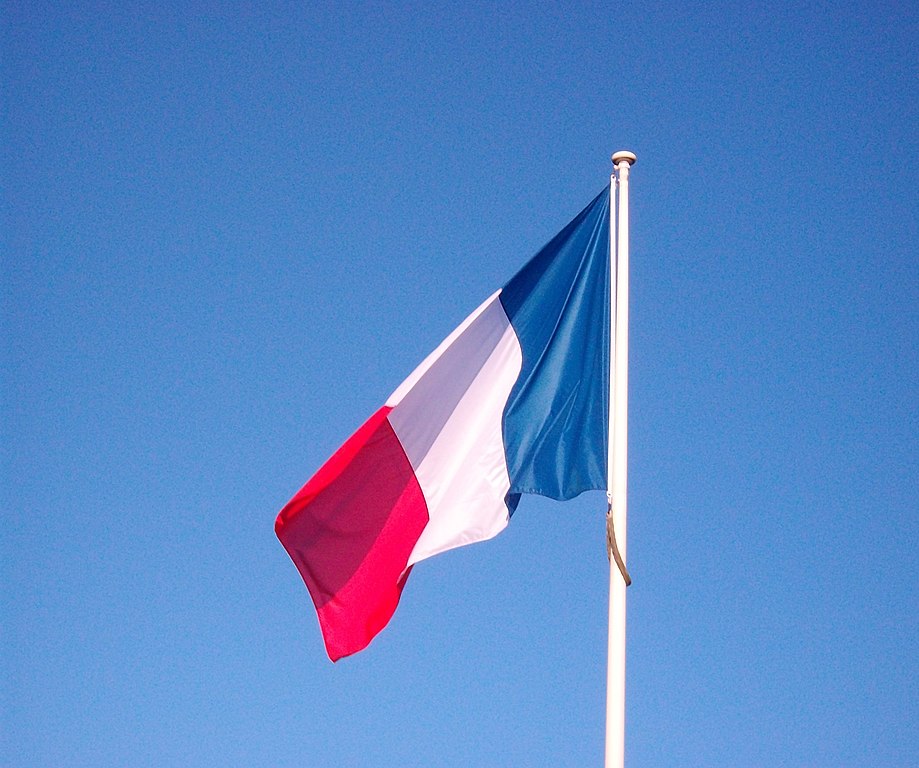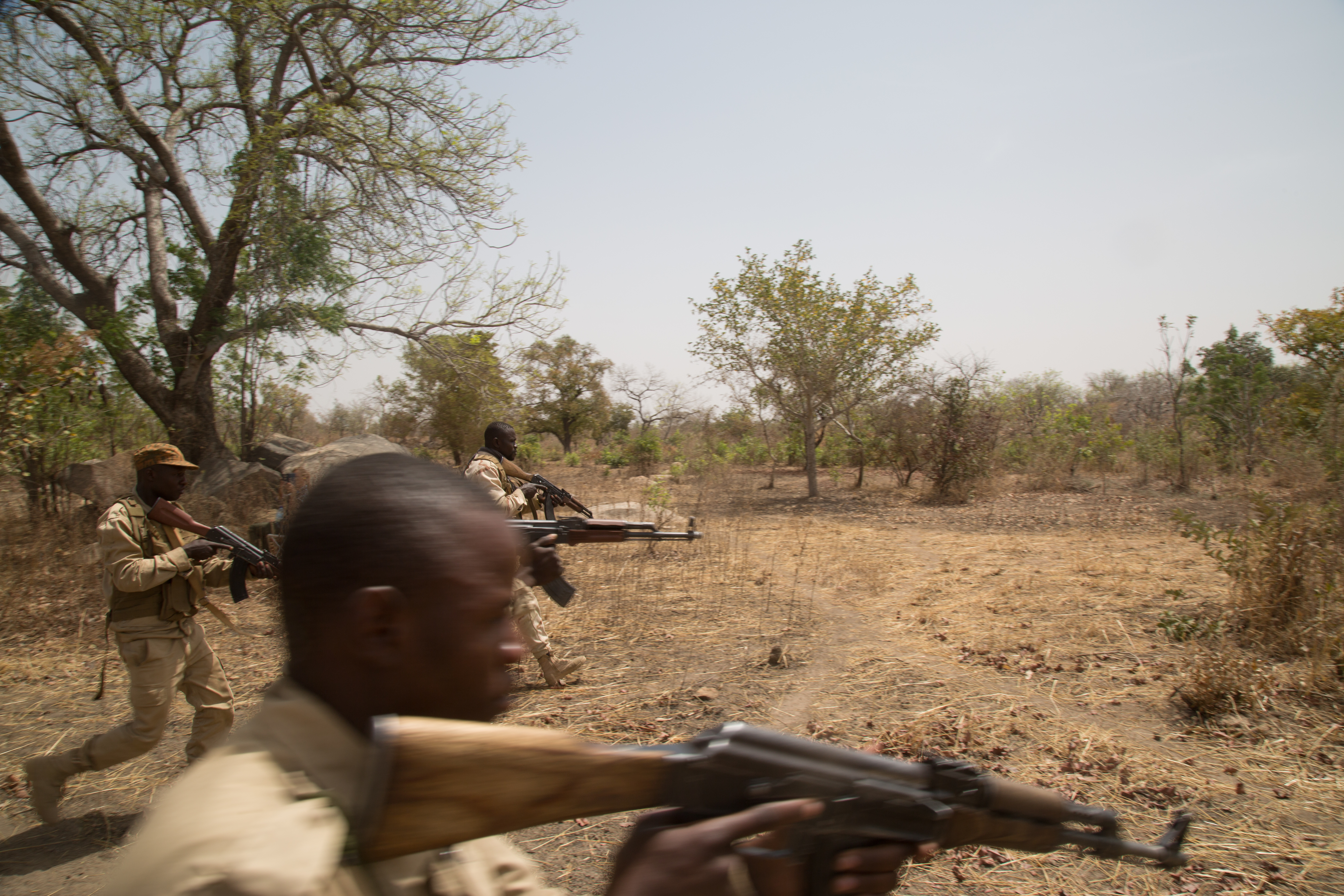
Burkinabe soldiers respond to an ambush during training at Exercise Flintlock near Po, Burkina Faso.
“Burkina Faso – like its neighbors Mali and Niger – have been hit for almost ten years by attacks by jihadist groups which have left more than 20,000 dead and two million displaced.”
Summary: Despite the Burkinabe government spending nearly 30% of the state budget on military equipment, the Al-Qaeda-affiliated group Jama’at Nasr al-Islam wal Muslimin has continued to conduct deadly and coordinated attacks against targets throughout the country.
Even with exceptional monetary investment in military equipment by Burkina Faso, the al-Qaeda affiliated jihadist group Jama’at Nasr al-Islam wal Muslimin (JNIM) continues to conduct deadly and coordinated attacks against government targets. According to the first excerpted article from French language news agency specializing in African economics, Agence Ecofin, a speech by the Minister of the Economy, Aboubakar Nacanabo, revealed Burkina Faso had spent more than $1 billion to acquire military equipment in the fight against terrorism.[i] While this amount might not be notable for many nations, these purchases totaled 30% of the entire state budget in 2023 and contributed to the government’s 6.7% budget deficit. To help with funding, Burkina Faso implemented a voluntary Patriotic Support Fund and, later, compulsory taxes on telecommunications systems and land to assist with funding defense purchases. Minister Nacanabo indicated that the government planned a similar financial allocation for defense equipment purchases in 2024, totaling 29.49% of the state budget.
Despite its considerable spending, Burkina Faso continues to struggle with organized and frequent terrorist attacks by armed jihadist groups such as JNIM. JNIM, originally based in Mali, has spread through many parts of Africa, including Burkina Faso, Niger, Benin, Togo, and Cote d’Ivoire.[ii] According to the second excerpted article from French-language public service news channel TV5 Monde, JNIM conducted a deadly attack on 11 June 2024, at the military installation in Mansila, near the border with Niger. The attack targeted homes and businesses in the town as well as the local military detachment. The government is yet to release an official report on the number of killed or wounded. The 11 June attack is just one in a long history of terrorist attacks affecting the country, with the article noting that over 20,000 have been killed by jihadist groups and over 2,000,000 have been displaced in Burkina Faso alone.
Nearly one third of the Burkinabe state budget is being spent on defense equipment purchases, and the ongoing armed conflict throughout the country raises questions about the efficacy of these purchases. Much of the military equipment purchased by the new regime is likely originating from Russia, as Burkina Faso and other Sahelian countries have moved away from Western aid.[iii] Though the country’s deteriorating security situation is currently a regional issue, Burkina Faso’s counterterrorism strategy and effective combat operations against groups like JNIM have broader U.S. policy implications. Transnational terrorist organizations have had a resurgence in conducting international attacks, which brings to the forefront the importance of stopping the spread of JNIM and the Islamic State from expanding to other neighboring African nations.
Sources:
“Burkina Faso: 1 milliard $ investis dans du matériel militaire en 2023 (Burkina Faso: $1 billion invested in military equipment in 2023),” Agence Ecofin (French language Geneve-based news agency), 7 June 2024. https://www.agenceecofin.com/economie/0706-119330-lien-burkina-faso-1-milliard-investis-dans-des-materiels-militaires-en-2023
Burkina Faso has been facing a security and humanitarian crisis for many years due to terrorist attacks, putting strong pressure on public finances. In 2023, the country’s budget deficit reached 6.7% due to security-related spending. Burkina Faso spent around $1 billion (more than 600 billion CFA francs), or 30% of the state budget, for the acquisition of military equipment in 2023. This information was revealed by Aboubakar Nacanabo (photo), minister of the Economy, during the program “Tribune of Accountability” broadcast on Radiodiffusion Télévision du Burkina.
According to the minister, this investment aims to strengthen the operational capabilities of the national armed forces in the fight against terrorism. Burkina Faso has, in fact, been facing a security and humanitarian crisis due to terrorist attacks for many years, putting strong pressure on public finances. In 2023, the country’s budget deficit reached 6.7% due to security-related spending, according to the government. However, Minister Nacanabo reassured the public by affirming that after these acquisitions, the government will gradually increase spending in other sectors. A move that could underline the administration’s commitment to ensuring balanced national development, despite pressing security challenges.
Note that Captain Ibrahim Traoré, president of the transition, has placed the fight against terrorism and the reconquest of the territory at the heart of his priorities; what is considered “essential” before the organization of national elections. As a result, several reforms have been put in place to respond more effectively to the crisis, notably the creation of the Patriotic Support Fund (FSP) in January 2023. Initially funded by voluntary contributions, the government introduced compulsory contributions on certain products and services to support the Fund. For the 2024 budget year, the Burkinabe government plans to allocate 29.49% of its budget to security-related expenses.
“Burkina Faso: quel bilan dans l’attaque djihadiste meurtrière à Mansila (Burkina Faso: what results in the deadly jihadist attack in Mansila),” TV5 Monde (Multi-nationally funded French language news outlet), 15 June 2024. https://information.tv5monde.com/afrique/burkina-faso-quel-bilan-dans-lattaque-djihadiste-meurtriere-mansila-2726176
The town of Mansila located in the northeast of Burkina Faso near Niger, was the target of a deadly jihadist attack on June 11, according to local and security sources. The authorities have not communicated on the attack claimed by the GSIM, affiliated with Al Qaeda.
A deadly jihadist attack, the exact toll of which is unknown, targeted the town of Mansila on Tuesday, in the north-east of Burkina Faso, near Niger, we learned on Sunday from local and security sources. On June 11, “ill-intentioned individuals stormed the detachment (military, editor’s note), our homes, our businesses and all other representations of the country”, indicates the association of pupils and students of Mansila, in a published press release on Facebook.
“At present, while we have not finished mourning our dead, many of our fathers, mothers, brothers, and sisters are missing,” continues this association, which calls on the authorities to “restore peace.” A security source confirmed the attack to AFP. “It is difficult to give a precise assessment, but there were losses in Mansila. Many elements are missing,” said this source.
The military detachments deployed in the various localities of Burkina generally comprise around 150 elements. No official report has been released, and the authorities have not communicated about this attack, which was claimed by the Support Group for Islam and Muslims (GSIM), affiliated with Al-Qaeda. Friday, the head of the military regime in power in Burkina Faso appeared on national television news, donating blood in the capital Ouagadougou, after two days of uncertainty following the fall of a shell in the courtyard of public television located near the presidency.
On Sunday, the presidency of Faso posted a message wishing a happy Eid to the country’s Muslims, accompanied by a photo of Captain Traoré praying. Burkina Faso – like its neighbors Mali and Niger – has been hit for almost ten years by attacks by jihadist groups which have left more than 20,000 dead and two million displaced. The authorities regularly claim to obtain victories over the jihadists, but the attacks continue, and part of the territory remains beyond the control of the army
Notes:
[i] Aboubakar Nacanabo’s speech took place in June 2024 during the “Tribune de la redevabilité (Tribune of Accountability)” broadcast on Radiodiffusion Télévision du Burkina.
[ii] The Office of the Director of National Intelligence published a foreign terrorist profile on JNIM, located here: “Jama’at Nursrat Al-Islam Wal-Muslimin (JNIM),” Office of the Director of National Intelligence Counter Terrorism Guide, Updated October 2022. https://www.dni.gov/nctc/ftos/jnim_fto.html
[iii] The M-DIME Research Project details Russia’s total Military DIME influence in Burkina Faso, including arms transfers. Lucas Winter, Jason Warner, and Amelia Cheatham, “Instruments of Russian Military Influence in Burkina Faso,” Foreign Military Studies Office, January 2024. https://fmso.tradoc.army.mil/burkina-faso-russia-m-dime-report/
Image Information:
Image: Burkinabe soldiers respond to an ambush during training at Exercise Flintlock near Po, Burkina Faso.
Source: https://commons.wikimedia.org/wiki/File:Burkinabe_soldiers_respond_to_an_ambush_during_training_at_Exercise_Flintlock_2019_near_Po,_Burkina_Faso,_Feb._26,_2019.jpg Attribution: Public Domain

.jpg)
